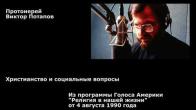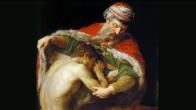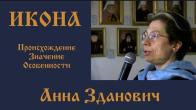You are here
XXIV: ON AN INTERPRETATION OF ZACCHAEUS
LIKE Zacchaeus you have now climbed up into a tree to see the Lord (Luke 19). You have done so not only by your power of thought or in a mystical, mental way. You are a human being and you have a body: therefore like Zacchaeus you have made use of your strength of limb and of earthly things to climb up from the ground. And if you have done so with understanding and quiet calculation, in consciousness of your own body's weight and limitations, but without fear or foolishness or side glances, you have also been fortunate enough to raise yourself so high that you can catch, over the milling mob of mankind, that is, your earthly impulses, a glimpse of Him you sought.
You observe that as you have begun to get a clearer sense of your own darkness, you are no longer drawn so strongly as before to entertainment and social life, and you have received, as it were, a little glimpse of your inner humanity as it really is. You think, perhaps, that up to now your heart has most resembled a nutshell of a boat rocking about without destination or helmsman; now the voyage has taken on goal and meaning, and happily so. None the less you are the same little nutshell of a boat on the wide sea; if you have voyaged aright you now see for the first time clearly how weak and small the boat is.
If only we show our good intention, the Lord is always Himself our Guide, says Archbishop Theophylact from Bulgaria. Jesus tells Zacchaeus: Make haste and come down; (that is, humble yourself), for today I must abide at thy house (Luke 19:5). House here can be understood as the heart. Truly, says the Lord, you have climbed up into a tree and conquered a part of your earthly desires because you wanted to see me, that is: you wanted to be able to perceive me when I passed that way in your heart. But make haste now to humble yourself lest you sit there thinking you are better than others, for it is in the heart of the humble that I must dwell. And he made haste and came down and received him joyfully (verse 6).
Zacchaeus, chief of the publicans, now received Christ, and the first thing he did was to give away all that he possessed. For half of his goods he gave straightway to the poor, and the remainder surely was quickly expended to repay fourfold those from whom he had demanded too much. He also is a son of Abraham (verse 9): he has heard the Lord's voice and has gone from his country and from his father's house (Genesis 12:1), where selfishness and passions ruled.
Zacchaeus knew that the heart which receives Christ must empty itself of everything else: it must offer all it has of illegitimately acquired riches: the lust of the flesh and the lust of the eyes and the pride of life (I John 2:16). He understood that he who is rich here is poor there, for to be physically rich is the same as being spiritually poor, explains John Chrysostom: for if the rich man were not so poor, he would never be so rich.
As impossible as to unite health and sickness is to reconcile love and wealth, Isaac the Syrian points out, for he who loves his fellow men gives away unconditionally all that he possesses: such is the nature of love. But without love there is no possibility of entering the kingdom of God. This Zacchaeus observed also.
But the less you possess, the simpler is your mode of life. All excess has been thrown away, and the heart gathers itself together at its core. Little by little it tries to get into the kernel, where the stairs to heaven are to be found.
Then prayer, too, becomes simpler. Prayers gather around the centre and enter it. There in the depths is seen the only prayer that is needful: the prayer for mercy.
For what can a sinner, and the chief among them (I Timothy 1: 15) desire other than that the Lord might have mercy on him? Has he anything to give? Does he have strength of his own, a will of his own, any composure of his own? Can he undertake anything by himself? Does he know anything? Does he understand, does he perceive anything, that he, who owns nothing, can call his own?
He owns nothing: for sin is nothingness, that which does not exist. Sin is emptiness, darkness, denial. There the sinner rests, in that nothingness.
As such he sees himself, and the less he himself possesses, the richer he is: for the emptied room within him is filled not with perishable goods, but with the fullness of eternal life, its light and its affirmation-love and mercy. It is the Lord who dwells as guest in his house.
But how can he, this sinner, merit the Lord's arrival? How can he ever imagine that the Lord will look upon him in his darkness? However he tries to cleanse himself, however he struggles and works, however he follows the commandment of the Gospel and watches and fasts and in every way endeavours to deny himself for the Lord's sake, he sees himself even so fall back into ill humour and quarrelsomeness, lovelessness and laziness, impatience and ingratitude and all imaginable vices. How can he ever expect the Lord to come into such a room?
Therefore he prays: Lord, have mercy. Have mercy on me, a sinner. For truly I have tried to do what it was my duty to do to serve Thee: I have ploughed the field of my heart that Thou gavest me to tend, and I have fed the cattle there (Luke 17:7-10), but I am only Thy humble servant and without Thee I can do nothing. So have mercy on me and fill me with Thy grace.
Through work he increases his faith (Luke 17:5), through prayer he gets strength to work.
Thus work and prayer live closely together, until they flow together and become one. His work becomes to pray, and his prayer is his work. This is what the saints call spiritual activity, the prayer of the heart, or the Jesus Prayer.
Address of our Cathedral
Subscribe to our mailing list
While all the materials on this site are copyrighted, you may use them freely as long as you treat them
with respect and provide attribution on the Russian Orthodox Cathedral of St.John the Baptist of Washington DC.









